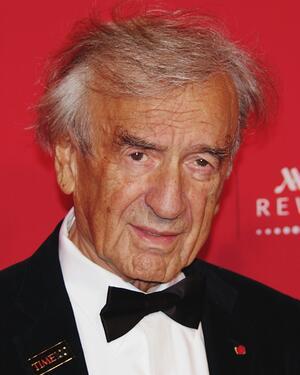Lessons from Elie Wiesel
I always thought of Elie Wiesel as the remote uncle who occasionally came to sit quietly at the Shabbat table, bearing witness to the Holocaust by virtue of his existence. His words were like torches in time, illuminating the shadowy indifference that had resulted in the deaths of six million, then lighting the path to a future where genocide would be no more.
Although I never met him in person, I felt he was the voice of my own suffering and sorrow; I, too, had fled a repressive regime, leaving home and family behind. I saw in him the possibility of taking my misery and translating it into a hopeful future where humanity could work together and embrace the common good.
His message, to never remain indifferent to suffering, has carved itself into the public conscience. Having lived through the turmoil of the Iranian revolution as a child and born witness to the way Iranian militants turned neighbors against one another, I have found my own fears and terrors alleviated by his brilliant stories.
Despite my fine Iranian education, I never heard of Elie Wiesel as a child and knew very little about the Holocaust. In my private school for girls we studied the Iranian curriculum of the 1970s. I was well versed in Iranian history and the great empire that had once spread from the edge of the Caspian Sea to the borders of Northern India. I learned about our great agricultural and mineral wealth, the story of the Muslim conquests, math, science, and the great Iranian poets and artists of the time. At home, I learned to be a Jew. I also learned that in order to survive, I was to never discuss politics or controversial topics in public.
I was aware that six million of my people perished during World War II but I had no personal connection to them. Six million was just a number in my mind. My grandparents visited Israel and returned telling stories of a Jewish homeland. We were proud to be Iranian Jews, we were proud of our newly established Jewish country. However, I had not yet visited the Promised Land and knew very little Jewish history. I knew only about the current situation in Iran, under the Shah’s oppressive rule. I was more concerned with the political upheaval and the tragedies that I was witnessing at the time, such as the horrific terrorist attack in August 1978 that took the lives of 400 innocent Iranians, who were burned to death in a locked movie theater. That to me was more concerning than the aftermath of the Yom Kippur war.
In my heart I was equal in value and potential to my peers, yet I was a two-time minority: a female and a Jew. I longed for a way to escape the constant barrage of fear and uncertainty. When I look back on those lonely years in Shiraz, which I spent hiding from the regime because my name was on their blacklist, I wish I had known of the works of Elie Wiesel.
When I was 17, I escaped from my homeland through the Kavira Lut desert, which Time Magazine has called the most dangerous desert in the world, and into Pakistan. I promised myself that if I survived I would share my story. I eventually found myself a Canadian political refugee at age 18. I spoke neither English nor French, but for the first time in a long time, I was happy. I was stunned and delighted that when I played classical music on my little radio no one called the authorities. When I entered the library I discovered a world of knowledge that was once forbidden to me. It is there that I discovered Elie Wiesel and Night. His work conveyed the commonality of the human experience; he not only spoke about his own loss, but about the greater loss.
Few people live lives of such significance. Elie Wiesel’s name has become synonymous with a moral compass. He spoke not only against genocide, but for those who had lost their voice; he refused to let injustice reign. He urged us to continue teaching our children to stand up against indifference, for he understood that that was the only way to defeat the tyrant.
To my beloved, remote “uncle” whose words and spirit occasionally graced our Shabbat table, I promise to continue carrying the torch and to write my own story of redemption and survival. Your legacy will always be remembered, for you taught us to oppose indifference and embrace our common humanity.









I happened across this inspiring story this morning while surfing the JWA website. I wish I could meet and have coffee with Dr. Sima Goel, a role model for courage and survival.